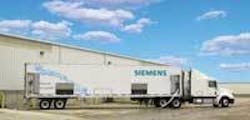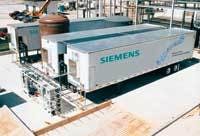Satisfying Refineries’ Thirst for Water
by Charles McCloskey
U.S. refineries are operating at record levels, creating an unprecedented demand for temporary water services. According to Cambridge Energy Research Associates, domestic refiners have increased production almost 14% since 1996 without building a single new plant.
Modernization, onsite capacity expansions, de-bottlenecking and efficiency gains have enabled this incredible production expansion. Record gasoline prices haven’t dampened demand that continues to grow 1-1.6% a year. America’s thirst for fuel will require continued capacity expansion in the years to come.
Conversely, most refineries are operating water treatment facilities installed in the ’60s and ’70s that simply can’t keep up with the demand for high quality water needed to sustain the required levels of online capability and efficiency. It has been estimated that 80 gallons of water are required for every barrel of oil processed. To fill the gap between “as is” and “as needed” water supply, many refineries are turning to temporary water services as an interim solution until new systems can be designed, purchased and installed.
Temporary water services can include emergency water supply, short-term operating agreements and long-term operating contracts commonly referred to as Build-Own-Operate (BOO) or outsourcing contracts.
Very short term or emergency water supply is often provided in the form of mobile demineralizer (MODI) services in trailer mounted configurations. These units are easy to install and require minimal power connections and hosed fittings to provide a “plug and play” solution. An additional advantage is offsite resin regeneration, eliminating onsite waste disposal. Units can usually be delivered and installed within 24 hours. Typical applications last several days up to several months. This solution works well for short-term repairs to the existing water plant and temporary requirements for supplemental water. Refinery process unit turnarounds, upgrades and repairs can disrupt the plant water balance, reducing returned condensate and requiring supplemental water supply to keep the rest of the plant operational. The use of MODI units can maintain the balance with no production interruptions.
Short-term operating agreements generally use reverse osmosis (RO) treatment technology to provide a more sustained supply for a number of months or several years. Such systems require more planning for siting, power supply and waste disposal. In refineries, an additional consideration is operating in a designated area where all equipment must be electrically upgraded to reduce the possibility of explosions. These systems are more cost effective and provide a reliable source of high quality water while longer term solutions are implemented. The switch to high quality RO water often results in downstream efficiency and reliability gains.
Longer term solutions will include modernization and upgrades to existing water treatment facilities, process expansion and BOO/outsourcing solutions. Refiners are looking to water treatment experts to design the systems needed to sustain their current and future levels of production. Many operators are choosing to concentrate on their core competencies and invest in production related projects by outsourcing their water treatment requirements. Providers can design, build, own and operate a system that will deliver contracted quality and quantity of water for five, 10 or 15 years.
Real World Examples
A west Texas refinery was operating a hot process precipitation softener, filters and zeolite softeners to supply water to its boilers, when repairs and operating costs began to escalate. Parts and expertise to fix the hot process softener were difficult to find, and upsets in the water treatment plant threatened boiler reliability and steam production. As a solution, Siemens Water Technologies installed two trailer-mounted RO systems to produce 600 gpm of high quality boiler feedwater. The plant’s existing filters were used for RO pretreatment, and the zeolite softeners were used for final polishing. The result was higher quality feed water lower in total dissolved solids (TDS) and silica, which resulted in improved boiler operations, better heat recovery and increased system reliability. The system was installed on an interim basis to allow for the design, purchase and installation of a new water plant.
A Midwest refinery added unit operations that required an additional 100 gpm of high quality water. In conjunction with Siemens Water Technologies, the operator took this opportunity to review its water needs on a broader basis. The refinery confirmed there was a bottleneck for required steam production at an existing water treatment facility servicing the south end of the plant. The water treatment facility was undersized, and at times, the water plant was bypassed, inadvertently sending raw city water to the boilers. This created the potential for heat robbing deposits and boiler tube failures, which would lead to excessive repair costs and outages. A system was designed and installed to provide water to new units and for boiler feed water. A single trailer-mounted system provides 500 gpm of higher quality water, resulting in significant energy savings for the plant.
An East Coast refinery already installed a BOO system to take the load off of its aging demineralizer system. About 50% of its water requirement was pretreated by an installed RO system and polished by existing demineralizers. In 2006, historic acid and caustic price increases, coupled with higher disposal and maintenance costs on the existing system, caused the operator to look for an expanded solution. The final straw was the shortage of parts and expertise to maintain reliability of the aging water plant control system. Siemens Water Technologies was chosen to expand the BOO contract to treat 100% of the plant’s water supply using clarification, filtration and RO, and to provide demineralizer polish via resin sluicing and offsite resin regeneration. Trailer- and skid-mounted equipment were provided to ensure water production during the ongoing installation and startup of the new system.
Conclusion
In summary, today’s refiners have a number of options for providing the amount and type of water needed to maintain their ongoing production expansion. Judicious use of emergency, temporary and outsourced water treatment solutions can help them maintain system up-time, reliability and efficiency.
About the Author: Charles McCloskey has served as market development manager for Siemens Water Technologies Mobile Services since 2005. He has been providing solutions to industrial water treatment customers for over 30 years, including those in the hydrocarbon processing industry (HPI). Contact: 847-706-6917 or [email protected]


